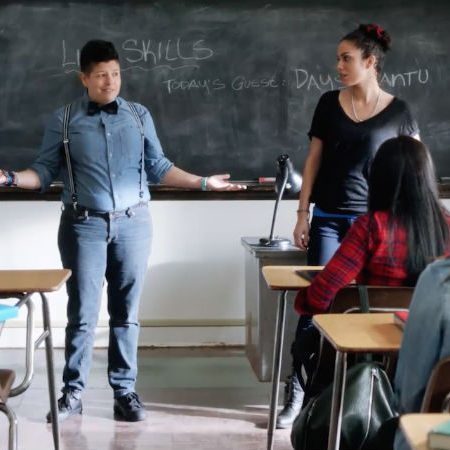When we see hate speech and injustice, we must hold tight to Michelle Obama’s words.
First Lady Michelle Obama’s speech on the opening night of the Democratic National Convention rocked, and her words and advice about hate speech resonated especially with many LGBTQ people.
In a surprisingly personal speech, Obama shared how she and Barack advise their daughters, Malia and Sasha, on how not to let name-calling, nastiness, and negativity ensnare them by remaining above the fray.
"We don't stoop to their level. Our motto is 'When they go low, we go high,'" Obama said.
In this 2016 presidential campaign season, which has many parents scratching their heads as to how to explain Trump to their children, Obama depicted the presidential race between simply choosing an appropriate role model.
In expressing her enthusiasm for Hillary Clinton’s nomination, Michelle Obama brought civility back into the public discourse. And in Michelle’s inimitable classy and cool style, she took down Trump in the most elegant way: She criticized the Republican presidential candidate without once uttering his name.
"I want someone with the proven strength to persevere. Somebody who knows this job and takes it seriously. Somebody who understands that the issues of our nation are not black or white. It cannot be boiled down to 140 characters."
When Michelle Obama uttered those words we immediately thought of Trump, because he is our omnipresent Twitter bully.
What comes with Twitter bullying is hate speech, and Trump has normalized hate speech in the public sphere. One of the signs of an intolerant society is demeaning language, whether used jokingly or in earnest, aimed at specific groups of people. When this form of verbal abuse becomes part and parcel of the everyday parlance, we have created a society characterized by zero tolerance of inclusion and diversity, and in which name-calling becomes an accepted norm.
I remember a 2006 interview with Ann Coulter, the conservative "pundit," on MSNBC’s Hardball, where Coulter called former Vice President Al Gore “a fag” and hinted that Bill Clinton might be gay.
“How do you know that Bill Clinton is gay?” host Chris Matthews asked.
“He may not be gay, but Al Gore; total fag. No, I’m just kidding,” Coulter spat. And in referring to Clinton, Coulter continued, “I mean, everyone has always known wildly promiscuous heterosexual men have, as I say, a whiff of the bathhouse about them.”
Perhaps Coulter intended to be funny or satirical, but her remarks were directed not only toward Gore and Clinton, but also toward LGBTQ people. Coulter took a swipe at Gore, Clinton, and the entire LGBTQ community in one fell swoop and with just one word.
Gay Wyoming student Matthew Shepard was bludgeoned and left for dead in near-freezing temperatures while tethered to a rough-hewn wooden fence because he was considered a “fag.”
Racial slurs are such a mainstay in the American lexicon that their broad-based appeal to both blacks and whites has anesthetized us not only to the damaging and destructive use of epithets, but also to our ignorance of their historical origins.
The Obamas have lived up to the advice they give their girls. Barack has been compared to the monkey Curious George, and shown wearing a feather headdress and a bone through his nose on Tea Party protest placards. Michelle has not avoided the perceptions and stereotypes of African-American women — combative, mouthy, not deferential enough, and the typical "angry black woman." The July 21, 2008, cover of The New Yorker satirically depicted then-presidential hopeful Barack Obama robed in Muslim garb fist-bumping his Angela Davis Afro-wearing, machine-gun-toting wife, Michelle. Eight years later, Trump still thinks Obama is not an American-born citizen and is conspiratorially a Manchurian Muslim.
Language is a representation of culture, and it perpetuates ideas and assumptions about race, gender, religion, sexual orientation, and gender identity that we consciously — and unconsciously — articulate in our everyday conversations about ourselves and the rest of the world, and consequently transmit generationally.
The liberation of people is also rooted in the liberation of abusive language. Using slurs, especially jokingly, does not eradicate their historical baggage and its existing social relations among us. Instead, using them dislodges these epithets from their historical context and makes us insensitive and arrogant regarding the historical injustices done to specific groups. They allow all Americans to become numb to the the power of hate speech and thwarts the daily struggle of trying to live in harmony.
This election year we have a candidate who's turned hate speech into a campaign platform. In response, I'm taking Michelle’s advice and directing it toward another first lady. They can go low, but I'm going "with her."


